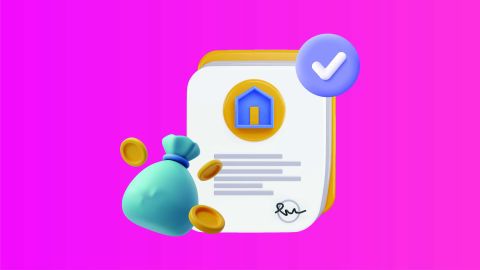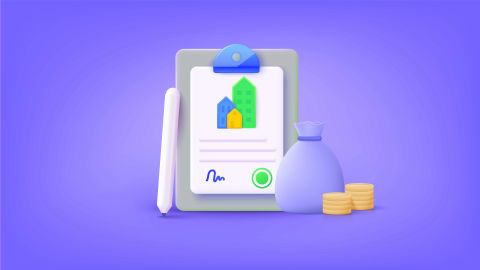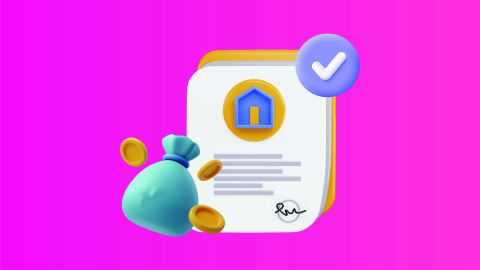A loan against property is a popular mortgage tool that both salaried and self-employed individuals could avail to meet their personal or business needs. This is a secured financing option, which means an individual is required to pledge a residential or commercial property as collateral for availing of the loan.
However, the leading concern of borrowers revolves around the rate of interest charged and the associated charges applied. While some of these charges are fixed, others vary based on the loan amount availed.
Looking for a substantial loan amount but hesitant to sell your property? A loan against property offers you the perfect solution. It allows you to unlock the true value of your real estate without parting with it. Whether it is funding a dream project or managing unforeseen expenses, leverage this financing option for competitive rates and flexible terms. With lenders like Bajaj Finance, you can even get large funds with minimal documentation. Get a loan against property with competitive interest rates and meet your immediate expenses without hassle.
Interest Rate
A loan against property has become the most attractive financial tool for individuals searching for funds owing to the competitive interest rates charged by lenders. The rate charged is primarily dependent on the loan tenor and the borrowed amount.
Borrowers have the option to choose between a fixed or an adjustable rate of interest. As the name suggests, a fixed interest rate stays the same throughout the loan tenor, while the adjusted rate varies as per the market setting.
The ROI differs from lender to lender but is generally observed to be within a range of 10-15%. However, Bajaj Finserv Loan Against Property comes at an interest rate of 8% to 18% per annum (fixed or floating rate of Interest) for salaried individuals and self-employed professional enjoy an interest rate of 8% to 18% (fixed or floating rate of interest) to borrowers opting for a fixed interest rate.
Did you know that a loan against property can help you save on taxes? If you’re utilizing the loan for housing needs, you can claim up to Rs. 2 lakh under Section 24B. So, while you secure funds for your goals, you also enjoy dual benefits—tax exemptions and asset retention. Make the most of your property’s value with a loan against property today. By using your property as collateral, you can unlock access to large funds of up to Rs. 10.50 crore—it is a smart way to manage your finances with ease! Get funds within 72 hours* of approval.
Some of the associated charges levied by lenders also include processing fees, loan statement charges, EMI bounce charges, etc. Let’s look at the details below:
Processing Fee
Lenders levy a non-refundable one-time fee from the borrowers during the submission of the loan application form. Typically, 7%* of the loan amount is charged as processing fees.
Additional Read: How is a Loan Against Property processed?
Foreclosure Charges
If all borrowers and co-borrowers are individuals, loan availed on floating interest rates, and loan taken for purposes other than business use, then there will be no foreclosure/ part-prepayment charges.
A loan against property offers more than just funds—it’s a pathway to realising your aspirations. Whether you are planning to expand your business, fund your child’s education, or consolidate debt, this secured financing solution comes with low-interest rates and flexible repayment options. Flexi Loan features make borrowing even easier, with interest-only EMIs and access to funds whenever needed. Why wait? Leverage your property for smart financial decisions.Get access to large funds with the flexibility to part-prepay your Flexi Loan at no extra cost.
Part pre-payment charges
Much like foreclosure charges, if all borrowers and co-borrowers are individuals, loan availed on floating interest rates, and loan taken for purposes other than business use, then there will be no part pre-payment charges. However, apart from above situation part pre-payment charges are applicable for term Loan up to 4.72% (inclusive of applicable taxes) of the principal amount of loan prepaid on the date of such part-prepayment. Part pre-payment charges are not applicable for Flexi Term Loan (Flexi Dropline) and Hybrid Flexi.
Statement Charges
Lenders might levy certain charges for providing loan statement fees or even separate interest and principal statement charges, over and above the interest.
EMI Bounce Charges
The borrower might default on his EMI payment due to insufficient funds in his account or some problem with auto-debit instructions or post-dated cheques.
Additional Read: List of documents needed to apply for a Loan Against Property
In such cases, the borrower will have to pay a bounce charge if the EMI is not paid within the grace period. Apart from this, borrowers might also have to pay bounced cheque charges. This charge can go up to a maximum of 2% of the loan amount.
Why let your property sit idle when it can fund your dreams? A loan against property offers long tenures of up to 15 years, enabling manageable EMIs. Opt for lenders like Bajaj Finance to enjoy additional features such as Flexi Loans, which let you borrow as per your need and repay comfortably. With competitive rates and easy disbursals, turning aspirations into reality is just a loan away. With a Bajaj Finserv Loan Against Property, you can unlock high-value funding at competitive interest rates. Whether it is for medical emergencies, business growth, or personal goals, your property empowers you to access the resources you need with ease. Don’t wait—Get our loan against property of up to Rs. 10.50 crore and turn your asset into a solution!
Conclusion
Remember the above list is not comprehensive; for full details on the charges levied, contact your preferred lender, and discuss the same with your financial adviser.
DISCLAIMER:
While care is taken to update the information, products, and services included in or available on our website and related platforms/websites, there may be inadvertent inaccuracies or typographical errors or delays in updating the information. The material contained in this site, and on associated web pages, is for reference and general information purpose and the details mentioned in the respective product/service document shall prevail in case of any inconsistency. Subscribers and users should seek professional advice before acting on the basis of the information contained herein. Please take an informed decision with respect to any product or service after going through the relevant product/service document and applicable terms and conditions. In case any inconsistencies observed, please click on reach us.
*Terms and conditions apply








